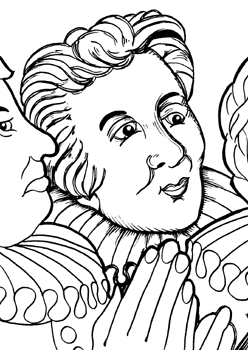 |
 |
|||
|
|
 Sir
Thomas Parry Junior
(1544-1616) Sir
Thomas Parry Junior
(1544-1616)Born: 1544 English Ambassador to France Chancellor of the Duchy of Lancaster Died: 24th May 1616 at Savoy, Westminster, Middlesex Sir Thomas was eldest son of Sir Thomas Parry Senior, Controller of the Royal Household, and Anne, daughter of Sir William Reade of Boarstall (Buckinghamshire) and Clapcot (Berkshire). In 1560, at the age of sixteen, he succeeded to his father's estates around Hamstead Marshall and Welford in Berkshire. At the former, he built a fine Renaissance house on the hill overlooking the parish church and soon he was elected MP for the county (1586), as well being appointed both Sheriff (1576 & 1588) and Deputy-Lieutenant (1596). In 1601, Sir Thomas was appointed Ambassador in France. The post was not to his liking, however, and he delayed his departure so often that Queen Elizabeth, who had knighted him on the occasion, was seriously displeased. King James reappointed him, in August 1603, and Sir Thomas remained in France until 18th March 1605. In recognition of his services, he was made Chancellor of the Duchy of Lancaster and a privy councillor on 30th December 1607. In 1608, he instituted a searching inquiry for particulars of church property belonging to the Duchy. On 4th January 1610, Sir Thomas was chosen MP for St. Albans and, on 9th June following, Lady Arabella Stuart - the King's cousin and rebellious claimant to the throne - was committed to his custody at his house in Lambeth, though it is also possible that she spent some time at Hamstead Marshall. After only seven months, however, Parry was ordered to resign her to the Bishop of Durham (15th March 1611) because King James had heard that Sir Thomas treated the lady more as a guest than a prisoner. He was given £300 for his trouble. In August 1612, Parry was one of the commissioners appointed to regulate the King's income and was returned as MP for Berkshire in 1614. Soon afterwards, he was suspended from the Chancellorship and the Privy Council, and ejected from Parliament, for interfering in the Stockbridge election. He was eventually restored to favour, but Sir John Daccombe was joined with him in the Chancellorship. In September 1615, he took part in the debate on the Royal expenditure. He died, without issue, in St. Mary, Savoy, on 24th May 1616 and was buried in Westminster Abbey on 1st June. His wife was Dorothy Brooke of Bristol, a maid of honour to Queen Elizabeth. She survived her husband until 1624, when she was buried in Welford Church, near Hamstead Marshall in Berkshire. To Parry, Pierre de Vezignol dedicated his poem called 'Le Combat de la Princesse Arete a l'encontre du Roy Croesus;' Many of Parry's letters are in the Cottonian and Harleian MSS. An extract from his copybook is now preserved in the Pepysian Library at Magdalene College, Cambridge, besides copies of letters to and from him, dated 1603-6, his correspondents being James I and Cecil. Edited from Sidney Lee's 'Dictionary of National Biography' (1895)
|
|||
| © Nash Ford Publishing 2001. All Rights Reserved. | ||||


